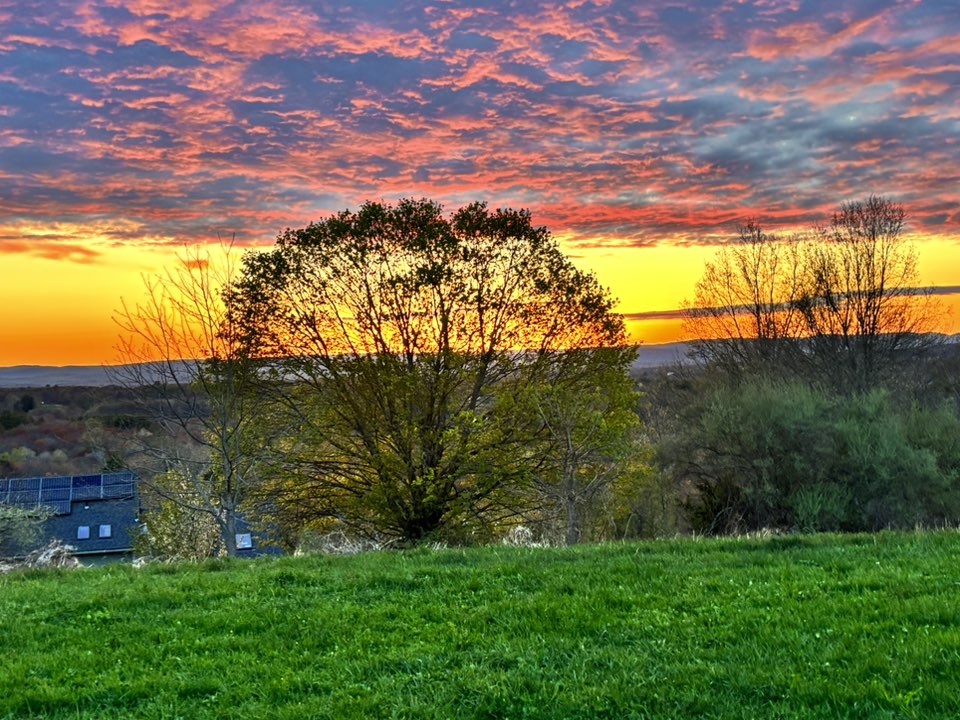Plans Proceeding for Landform Observatory Atop Mt. Pollux

Mt. Pollux, Amherst, MA. April 2025. Photo: Vira Douangmany Cage
The dedication of the Mount Pollux Landform Observatory planned for the end of August is delayed due to the town’s backlog in creating new signage. A preliminary version of a virtual exhibit of the observatory will be available on the Pioneer Valley Landform Observatory website. Thomas Johnson, a member of Friends of Mt. Pollux, said that he is still working with his geology advisors at UMass and the Beneski Museum of Natural History at Amherst College on final tweaks to the contents, but feedback has been positive thus far. The first parts of a virtual reality section should be available on the website later this month.
The creation of the Mount Pollux Observatory was approved by the Conservation Commission in January. Mount Pollux is one of two glacial drumlins in Amherst (the other being Mt. Castor) formed 50,000 years ago. The 360-degree view from the 345-foot summit affords views of the Pocumtuck (Pioneer) Valley and surrounding highlands, which, according to Johnson, “are the site of remarkable geohistorical events stretching back as far as when continents collided 485 million years ago and formed the Berkshires to the west, to the recent formation of Lake Hitchcock at the end of the last ice age 7,000 years ago. The Pelham Hills to the east (330 million years old) are the remnant of a towering “altiplano” that covered what is now central Massachusetts, while the Holyoke Range forming the south edge of the Pocumtuck Valley was created by the rifting of the Connecticut River Basin 200 million years ago.”
The installation of signage on Mount Pollux will explain the geomorphology of Mount Pollux and its surrounding area. The proposal by the Friends of Mount Pollux will include the drumlin in a system of Pocumtuck Valley Landform Observatories that will also include Mount Sugarloaf in South Deerfield and the Mount Holyoke Summit House in Hadley. The observatories are the result of a partnership between University of Massachusetts Amherst College of Natural Sciences; the Commonwealth of Massachusetts Department of Conservation and Recreation (DCR); State Geologist, Brian Yellen of Amherst; the Massachusetts Geological Survey; and the Friends of Mount Pollux.
Mount Pollux is slated to receive a new informational kiosk as part of a $100,000 Community Preservation Act (CPA) grant for signage at recreation and conservation areas, recommended by the town’s CPA committee for FY2026.

I am such a curmudgeon. Why do we need a $100,000 kiosk on Mt Pollux? Why can’t we just enjoy the beauty and let people do their own research? At least, please don’t put it on the top which used to only have gorgeous trees but now has benches and is beginning to feel like any other park.
I believe the $100,000 in CPA money was for signs and kiosks at many conservation areas, including Mt. Pollux. The landform kiosk will describe the geology of the glacial drumlin.
I’m with Judith. Mt. Pollux is a treasure. Why ruin it with signage? Maybe plant another tree on top but leave it at that. If people want interpretive info they can Google it.
Maura where exactly will this kiosk be located? I appreciate the work bring done to fix the parking lot and entry driveway.
I agree with Judith and Eric. Mt. Pollux is a special place and a kiosk will severely diminish its natural, untouched atmosphere. One more town initiative to commodify what’s better left alone. Skip the signage please!